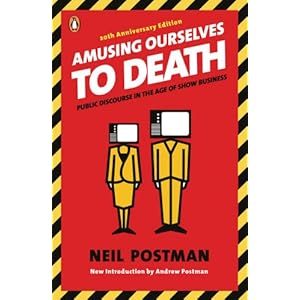How the Medium Changes the Message
Amusing Ourselves To Death
I’ve recently read “Amusing Ourselves to Death” by Neil Postman, a fascinating book from 1985 about the effects of television on American culture and the nature of public debate. In the book, Postman argues persuasively about how the medium used to convey a message always has a profound effect upon how that message is received and interpreted. In a former age dominated by the printing press, people were used to long and sophisticated arguments in which propositions were laid out and supported with evidence, with each step of the argument depending on the foundation laid previously. In the age of television, people might turn on part way through a show and can change channels the minute you start making demands of their intellect, and the emotional impact of something is considered far more important than any basis in fact or reason. Each segment of a TV show needs to be as independent as possible from all previous segments, requiring as little context as can be achieved. Entertainment is the name of the game – on television, even the news shows have dramatic intro music and multiple camera angles to keep your attention.
When Religion Becomes Entertainment
During the course of the book, Postman shows how this predisposition to entertainment inevitable affects even the more “serious” shows. He focusses in on the areas of news, religion, politics and education. For obvious reasons, I was particularly interested in his chapter on religion, and it’s given me a lot of food for thought as I work on my Old Testament adventure game. In particular, he argues that the religion you find on television is very different from that which you find in the Bible. TV religion is light on explicit theology and actual statements about what God is like; TV religion makes no demands on its viewers; TV religion has no controversial teachings such as about sin or judgement; TV religion helps us feel good about who we are. Postman’s point is that this is inevitable – it’s in television’s DNA to favour broadcasting that first and foremost entertains. It’s simply too easy for viewers to change the channel if it’s any different. The medium used to convey a message always has a profound effect upon how that message is received and interpreted.
Making a Game Out of the Bible

This principle clearly transfers to computer games as well. An early attempt at a Christian video game that I come back to frequently is “Bible Adventures” by Wisdom Tree, since it’s paradigmatic of many that have come since. Take their Noah game: it takes a story from the Bible and then, quite understandably, uses a fairly obvious approach in translating it into game form – requiring you to seek out and catch all of the animals before bringing them into the ark. Unfortunately, as anticipated by Postman, this change in medium brings with it a significant shift in the message itself. The game and the Bible passage end up with very little resemblance of each other, save for the names of the characters. It ends up being a game all about this strong man Noah who can lift cows and oxen above his head and the great drama of whether he’ll be able to catch all of the animals before the floods come. All of the drama of the Bible passage itself is lost – there’s none of the sense of anticipation for whether God will manage to reverse the effects of the fall, and if this man Noah will turn out to be one who was righteous in the way that Adam failed to be. The medium used to convey a message always has a profound effect upon how that message is received and interpreted.
As I’ve said many times before, the nature of games is that they tend to focus in on the question of “are you worthy?” Are you good enough to beat this game – are you fast enough, smart enough, dedicated enough? It’s very hard to convey the sovereignty of an all-powerful God and dependence upon the merits of another in typical game form. I think the fact that Ebenezer is an adventure game helps with a lot of these issues, but it’s still an open question for me whether other genres of game might work too. What do you think?
-
Categories
-
Articles
- July 2014
- June 2014
- January 2014
- March 2013
- March 2012
- February 2012
- January 2012
- October 2011
- August 2011
- July 2011
- June 2011
- April 2011
- March 2011
- February 2011
- January 2011
- December 2010
- November 2010
- June 2010
- May 2010
- April 2010
- March 2010
- February 2010
- December 2009
- October 2009
- August 2009
- July 2009
- June 2009
- May 2009
- March 2009
- February 2009
- January 2009
- November 2008
- August 2008
- March 2008
- January 2008
- December 2007
-
Meta






